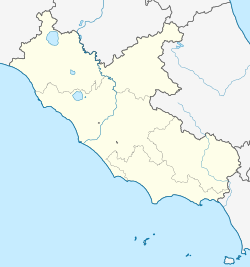Ausonia is the ancient Greek name for lower Italy, extended poetically to all Italy.

Nettuno is a town and comune of the Metropolitan City of Rome in the Lazio region of central Italy, 60 kilometres south of Rome. A resort city and agricultural center on the Tyrrhenian Sea, it has a population of approximately 50,000.
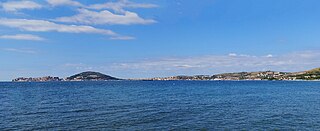
Gaeta is a city in the province of Latina, in Lazio, Italy. Set on a promontory stretching towards the Gulf of Gaeta, it is 120 kilometres from Rome and 80 km (50 mi) from Naples.

Enna, known from the Middle Ages until 1926 as Castrogiovanni, is a city and comune located roughly at the center of Sicily, southern Italy, in the province of Enna, towering above the surrounding countryside. It has earned the nicknames belvedere and ombelico ("navel") of Sicily.
Formia is a city and comune in the province of Latina, on the Mediterranean coast of Lazio, Italy. It is located halfway between Rome and Naples, and lies on the Roman-era Appian Way.

Itri is a small city and comune the province of Latina, Lazio, central Italy.

Fondi is a city and comune in the province of Latina, Lazio, central Italy, halfway between Rome and Naples. As of 2017, the city had a population of 39,800. The city has experienced steady population growth since the early 2000s, though this has slowed in recent years.
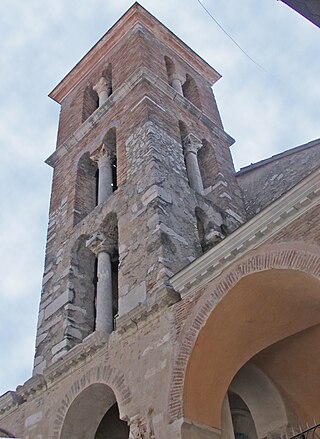
Minturno is a city and comune in southern Lazio, Italy, situated on the north west bank of the Garigliano.

Sessa Aurunca is a town and comune in the province of Caserta, Campania, southern Italy. It is located on the south west slope of the extinct volcano of Roccamonfina, 40 kilometres (25 mi) by rail west north west of Caserta and 30 kilometres (19 mi) east of Formia.
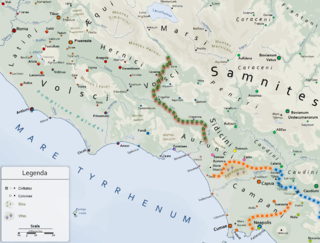
The Aurunci were an Italic tribe that lived in southern Italy from around the 1st millennium BC. They were eventually defeated by Rome and subsumed into the Roman Republic during the second half of the 4th century BC.

Ariccia is a town and comune in the Metropolitan City of Rome, Central Italy, 25 kilometres (16 mi) southeast of Rome. It is in the Alban Hills of the Lazio (Latium) region and could be considered an extension of Rome's southeastern suburbs. One of the Castelli Romani towns, Ariccia is located in the regional park known as the "Parco Regionale dei Castelli Romani".
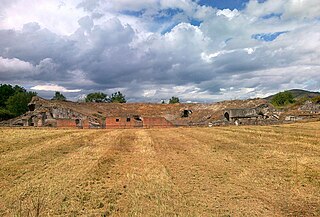
Cales was an ancient city of Campania, in today's comune of Calvi Risorta in southern Italy, belonging originally to the Aurunci/Ausoni, on the Via Latina.

Mirabello Sannitico is a small town in the province of Campobasso, Molise, southern Italy. The population is about 2,100 inhabitants. It has an agrarian-based culture and history, dating back to at least the 12th century. Nearby towns include Campobasso to the northwest and Vinchiaturo to the southwest. The Tappino River flows on either side of the town on the north and south.

"Ausones", the original name and the extant Greek form for the Latin "Aurunci", was a name applied by Greek writers to describe various Italic peoples inhabiting the southern and central regions of Italy. The term was used, specifically, to denote the particular tribe which Livy termed the Aurunci, but later it was applied to all Italians, and Ausonia became a poetic term, in Greek and Latin, for Italy itself.

Zagarolo is a town and comune in the Metropolitan City of Rome, in the region of Lazio of central Italy. It lies 34 kilometres (21 mi) southeast of Rome, and it borders the municipalities of Colonna, Gallicano nel Lazio, Monte Compatri, Palestrina, Rome, San Cesareo.

Cori is a city and comune in the province of Latina, in the Lazio region of central Italy.

Esperia is a comune (municipality) in the Province of Frosinone in the Italian region Lazio, located about 110 kilometres (68 mi) southeast of Rome and about 40 kilometres (25 mi) southeast of Frosinone. It is located within the Monti Aurunci Natural Park.

Suio is a frazione of Castelforte, a municipality in southern Latium, central Italy.
The ancient city of Aurunca was the capital or metropolis of the little mountain tribe of the Aurunci, was situated on one of the summits of the volcanic group of mountains, which rise above the plains of Campania, near Suessa and Teanum.
Santa Maria di Correano is a Romanesque style, Roman Catholic church in the town of Ausonia, province of Frosinone, region of Lazio, Italy.





